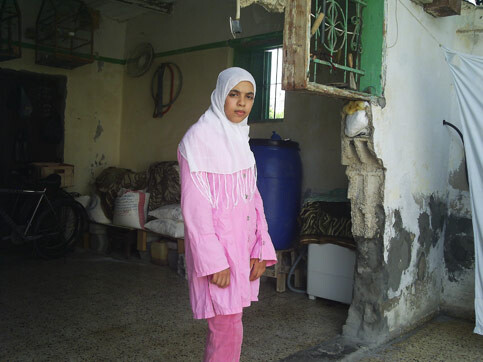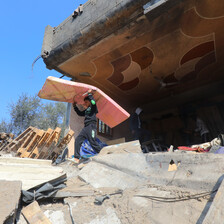Maghazi refugee camp, Gaza Strip 8 September 2008

Alaa in her family’s home in the Maghazi refugee camp. (Rami Almeghari)
Thirteen-year-old Alaa has grown up in Gaza’s Maghazi refugee camp and her family’s home is an example of the typical “old-new” refugee camp dwellings. Comprised of three rooms, a wretched kitchen and an old-fashioned bathroom, the whole house is in need of urgent repair. Yet, because of the lack of raw materials, the UN agency for Palestine refugees, UNRWA has been postponing the renovation until further notice. Alaa lives in the same unhealthy house with her mother, two brothers and three sisters. Although poor, Alaa is a brilliant student.
“In winter, I carry my school books from corner to a corner in the house as drops of rain fall from many parts of the ceiling. But what can I do? I should succeed, I should keep up. I want to be an optical physician to help change our life,” Alaa said, smiling.
Last year, Alaa got the highest marks in her school; her scores on all topics were more than 98 percent. For the past three years, Alaa was recognized as an honor-roll student at Maghazi’s prep school for girls, administered by UNRWA. It is the only prep school in the camp with a population of 30,000.
“In addition to our modest house as you see, where I can hardly find a good place for study, I used to spend nights without electricity because of the frequent power outages here. However, I am keen to keep up, I am keen to succeed, to suppress the oppression, me and my family are going through,” Alaa explained.
All of her teachers at the prep school predict a promising future for Alaa. “Alaa is a brilliant girl, who will definitely have a promising future and I do hope all the best for her,” said Kifah, Alaa’s science teacher.
Alaa is an avid reader who also enjoys watching TV. She has already memorized more than two-thirds of the Quran. “I do not only read, I also read and inquire, especially when it comes to the religious teachings of Islam. Sometimes I ask our religion teacher at the school. I feel I cannot take things for granted,” she explained.
The death of her father death two years ago inspired Alaa to study and succeed. “When my father was laid to rest two years ago, my mother undertook the responsibility for the whole family, as my two brothers are still too young and cannot work,” Alaa recalled.
“However, my mother does not work, [but] God has enabled us to get support by good charitable peoples and societies, which began to sponsor us, though their assistance has not been enough,” she explained.
Asked how can they manage, Alaa’s mother Samira explained that “before her father died, we used to rely on his modest salary, but now we are depending on some food assistance from UNRWA as well as help from some charitable societies.”
Most of the refugee school children in the Gaza Strip receive free education services through UNRWA. Her mother explained that “Alaa is being sponsored by a benevolent man, who sends her a sum of 120 shekels per month ($30 US), through a local charitable society, but this is not enough.”
Alaa’s sister Hala, a 22-year-old university graduate, looked forward to the day that her brilliant sister would be able to enroll in university, and hopefully obtain a scholarship if she continues to excel in school. Hala now owes half of her university education fees, and she hopes to work in order to pay back the university.
Last year Alaa was ranked second at her grade level and this year she is determined to be first. As we were leaving she said, “I appeal to all those concerned to address the root causes of our problems, I mean here the Israeli occupation, whose blockade on Gaza has deprived me of a better house and has stolen sweet moments of my life.”
Rami Almeghari is contributor to The Electronic Intifada, IMEMC.org and Free Speech Radio News. Rami is also a former senior English translator at and editor-in-chief of the international press center of the Gaza-based Palestinian Information Service. He can be contacted at rami_almeghari A T hotmail D O T com.
Related Links





